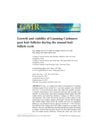 January 2024 in “ACS Biomaterials Science & Engineering”
January 2024 in “ACS Biomaterials Science & Engineering” A new method using a microfluidic device can prepare hair follicle germs efficiently for potential use in hair loss treatments.
54 citations,
December 2011 in “American Journal Of Pathology” A Gsdma3 mutation causes hair loss due to stem cell damage from skin inflammation.
51 citations,
August 2013 in “The Journal of experimental medicine/The journal of experimental medicine” Loss of a specific protein in skin cells causes symptoms similar to psoriasis.
 36 citations,
September 2009 in “Journal of Cellular and Molecular Medicine”
36 citations,
September 2009 in “Journal of Cellular and Molecular Medicine” New treatments targeting skin stem cells show promise for skin repair, anti-aging, and cancer therapy.
 April 2017 in “Journal of Investigative Dermatology”
April 2017 in “Journal of Investigative Dermatology” The hair follicle dermal sheath is essential for hair shedding and needs to communicate with the outer root sheath for normal hair growth cycles.
 21 citations,
November 2022 in “Frontiers in immunology”
21 citations,
November 2022 in “Frontiers in immunology” Sebaceous glands play a key role in skin health, immunity, and various skin diseases.
 156 citations,
August 2016 in “Journal of controlled release”
156 citations,
August 2016 in “Journal of controlled release” Tight junctions are key for skin protection and controlling what gets absorbed or passes through the skin.
 10 citations,
July 2011 in “Springer eBooks”
10 citations,
July 2011 in “Springer eBooks” Carboxytherapy can improve skin conditions with few side effects, but results may vary and are not guaranteed.
 28 citations,
August 2015 in “Journal of Drug Targeting”
28 citations,
August 2015 in “Journal of Drug Targeting” The new CoQ10 gel protects mouse skin better against aging from UV light than the old gel.
 10 citations,
January 2014 in “Genetics and Molecular Research”
10 citations,
January 2014 in “Genetics and Molecular Research” Liaoning Cashmere goat hair follicles show synchronized growth patterns with lowest activity in May.
 May 2023 in “Current Applied Science and Technology”
May 2023 in “Current Applied Science and Technology” Higher power CO2 laser causes more severe skin burns and damage.
 April 2024 in “Frontiers in cellular and infection microbiology”
April 2024 in “Frontiers in cellular and infection microbiology” Blue light might help treat skin conditions by affecting the skin's bacteria.
 1 citations,
September 2023 in “The journal of investigative dermatology/Journal of investigative dermatology”
1 citations,
September 2023 in “The journal of investigative dermatology/Journal of investigative dermatology” Skin organoids from stem cells can help study and treat skin issues but face some challenges.
9 citations,
July 2019 in “Journal of cosmetic dermatology” Topical PRP cream may improve facial skin by boosting collagen.
 September 2023 in “The FASEB journal”
September 2023 in “The FASEB journal” Foxn1 is important for fat development, metabolism, and wound healing in skin.
35 citations,
January 2011 in “Journal of Biological Chemistry” sPLA2-X is crucial for normal hair growth and follicle health.
 30 citations,
March 2017 in “ACS biomaterials science & engineering”
30 citations,
March 2017 in “ACS biomaterials science & engineering” Hair follicles are valuable for regenerative medicine and wound healing.
 January 2017 in “Springer eBooks”
January 2017 in “Springer eBooks” The document explains various skin conditions and their treatments.
 1 citations,
July 2022 in “Functional foods in health and disease/Journal of functional foods in health & disease”
1 citations,
July 2022 in “Functional foods in health and disease/Journal of functional foods in health & disease” Taking a probiotic supplement twice a day improved hair growth, skin hydration, and metabolic health in adults at risk of metabolic syndrome.
 12 citations,
July 2020 in “International Journal of Pharmaceutics”
12 citations,
July 2020 in “International Journal of Pharmaceutics” Iron oxide nanoparticles improve skin penetration and drug release for hair loss treatment.
 124 citations,
December 2016 in “Pharmaceuticals”
124 citations,
December 2016 in “Pharmaceuticals” TRP channels in the skin are important for sensation and health, and targeting them could help treat skin disorders.
 60 citations,
March 2014 in “Veterinary dermatology”
60 citations,
March 2014 in “Veterinary dermatology” Cats with atopic dermatitis often have severe, year-round itching and respond well to certain treatments.
 1 citations,
May 2023 in “Journal of molecular evolution”
1 citations,
May 2023 in “Journal of molecular evolution” Pangolins have lost some skin-related genes, but kept others, leading to their unique scales and skin features.
 January 2024 in “RSC pharmaceutics”
January 2024 in “RSC pharmaceutics” Removing the outer skin layer increases drug absorption and offers non-invasive treatment options, with some methods allowing for quick skin recovery.
 55 citations,
June 2009 in “Journal of Pharmaceutical Sciences”
55 citations,
June 2009 in “Journal of Pharmaceutical Sciences” Minoxidil promotes hair growth by penetrating skin, with ethanol-containing formulas working best.
 January 2014 in “Journal of Investigative Dermatology”
January 2014 in “Journal of Investigative Dermatology” Proteins like aPKC and PDGF-AA, substances like adenosine and ATP, and adipose-derived stem cells all play important roles in hair growth and health, and could potentially be used to treat hair loss and skin conditions.
 May 2002 in “British Journal of Dermatology”
May 2002 in “British Journal of Dermatology” A pregnant woman's skin condition improved after giving birth, possibly due to high estrogen levels during pregnancy.
 August 2023 in “Medicina-lithuania”
August 2023 in “Medicina-lithuania” Abusing steroids can damage your heart, muscles, reproductive system, liver, skin, and brain, and may increase the risk of Alzheimer's disease.
 1 citations,
December 2022 in “Archives of Dermatological Research”
1 citations,
December 2022 in “Archives of Dermatological Research” Acne treatment with isotretinoin increases the presence of p53, a protein, in skin and oil glands, which may help reduce acne severity.
 16 citations,
July 2012 in “Current pharmaceutical biotechnology”
16 citations,
July 2012 in “Current pharmaceutical biotechnology” New treatments for skin conditions related to the sebaceous gland are being developed based on current research.


























